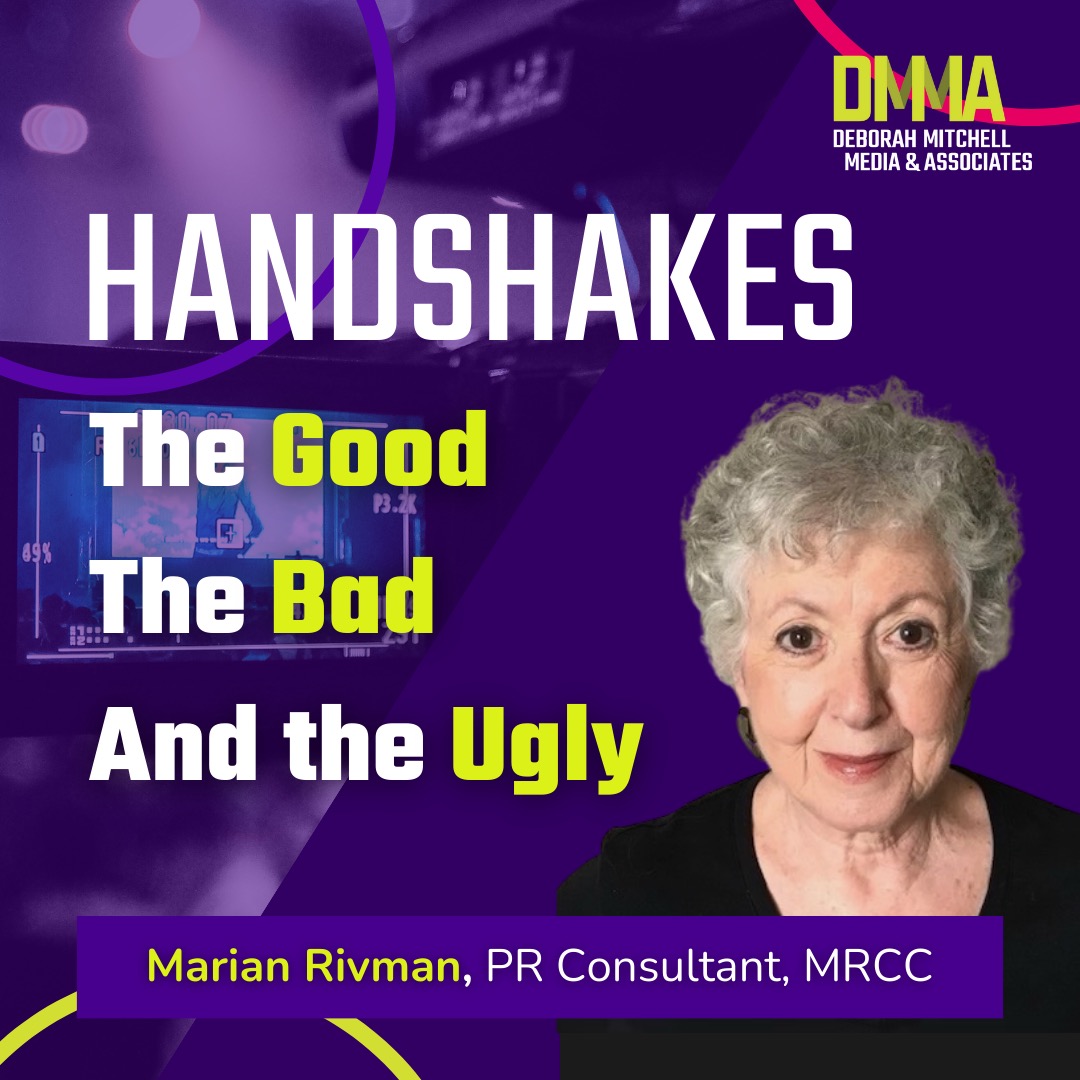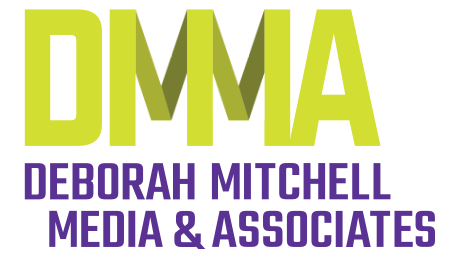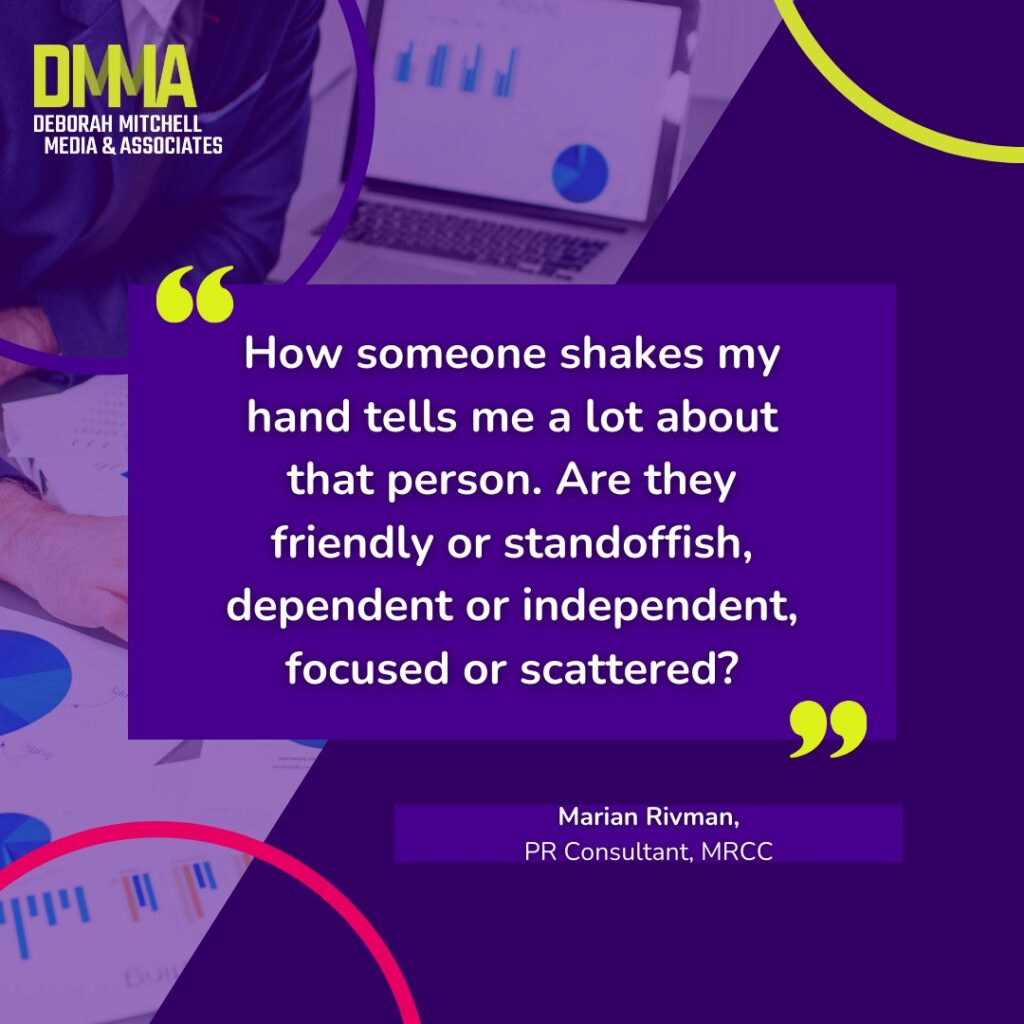Handshakes: The Good, The Bad, And The Ugly
Article Contributed by Marian Rivman

How someone shakes my hand tells me a lot about that person. Are they friendly or standoffish, dependent or independent, focused or scattered?
In my more than three decades as a public relations and communications consultant, I have shaken more than my fair share of hands. Thanks to my eclectic client roster, the hands I was shaking belonged to an amazingly diverse cross-section of people including diplomats, corporate executives, community leaders, and celebrities.
The momentary act of shaking someoneʼs hand is an incomparable communications tool. A handshake is much more than Wikipediaʼs definition: “A short ritual in which two people grasp one of each otherʼs like hands, in most cases accompanied by a brief up and down movement of the
grasped hands.” Despite its brevity, a handshake is an extremely effective way to have a memorable one-on-one connection with another person.
When did this widely accepted and expected cultural convention start? There is no definitive answer since the beginning of the handshake predates written history. However, historians agree that whenever and wherever it started, handshakes were a “man thing.” If two men met and displayed empty right hands, they could assume one would not be attacked by the other.
Since I consider myself something of a handshake aficionado, I take full advantage of the opportunity the gesture offers. Itʼs an incredible source of personal data. In that moment when two peopleʼs hands are touching and they are directing their focus and energy on each other, a dozen blogs
and 1,000 tweetsʼ worth of information is being transmitted.
The Good (This handshake labels you a “player” in the business game)
A good handshaker is focused. Full attention is paid to the person whose hand is to be shaken. Eye contact is made. The right hand is extended perpendicular to the ground, fingers are open–especially the thumb and pointer. In the days of the dagger, the open hand signified that you were approaching in peace and did not have a weapon up your sleeve. Today, it means the same thing, only figuratively. A person who shakes with an open hand is someone who can be trusted. How many shakes? Two and then stop. While itʼs acceptable to hold someoneʼs hand after completing the shakes, a good handshaker knows when to let go. Pay attention to people with good handshakes. These are the “players” you want to do business with.
The Bad (This handshake could get you sidelined in the business game)
There are a variety of bad handshakers. Thereʼs the knuckle-crusher who squeezes your hand so hard it hurts. That unnecessary display of strength lets me know that thatʼs someone who needs to be in charge and could be overbearing. The pumper shakes your hand enough times to make you think they are hoping to hit water. That kind of over-enthusiasm can be exhausting. Then thereʼs the dead fish shaker who basically deposits his/her hand in yours and lets you do all the shaking. You have to wonder if that person will carry their weight if you work together. Last, but not least, there are those people who proffer dirty or sweaty hands for you to shake. Thereʼs no excuse for that. Carry a hand sanitizer so youʼre always handshake ready. If you have a sweaty palm problem, carry a handkerchief. Bad handshakers can often end up sidelined.
The Ugly (This handshake will get you benched in the business game)
The most egregious and, unfortunately, all-too-common handshaking mistake people make is to unconsciously shake someoneʼs hand without any eye contact or modicum of attention. They are too busy looking around for someone more important or interesting to meet. Itʼs rude and unpleasant. These are people I avoid; theyʼre indefinitely benched.
Do you have a good handshake? Itʼs a skill well worth developing. Itʼs an effective way to make a good impression and to let the world know youʼre a “player.” Thereʼs a reason politicians spend hundreds of hours shaking thousands of hands.
Marian Rivman is a New York-based public relations and communications consultant. Her clients have included UN agencies, Fortune 500 companies, international non-profits, bold-faced names and the recreational scuba diving industry. She is known for her unbounded energy, directness, and skill at translating complex issues into comprehensible messages for an array of audiences. Marian is particularly interested in the power of non-verbal communication. In addition to her independent consulting work, Marian is affiliated with New Solutions.







